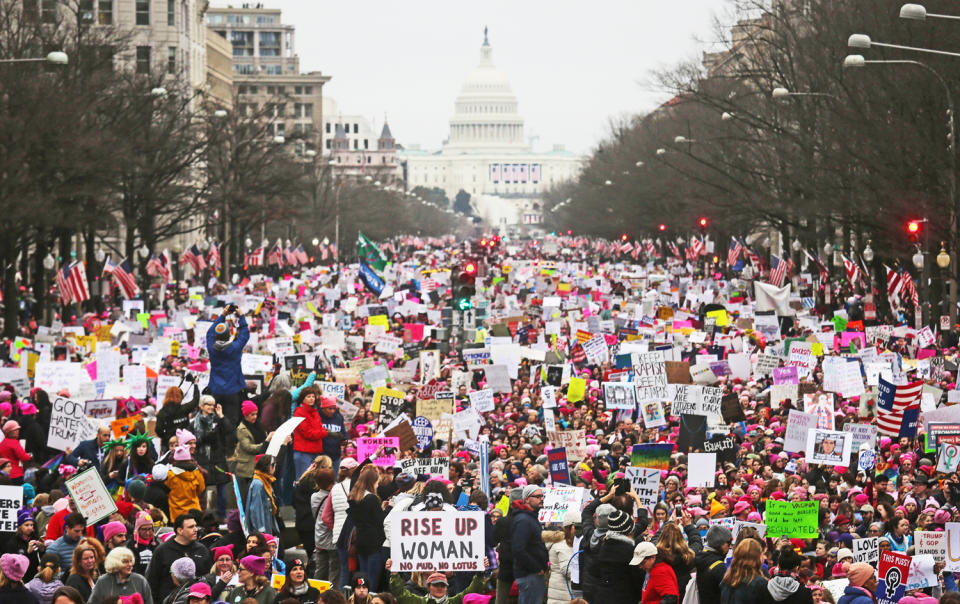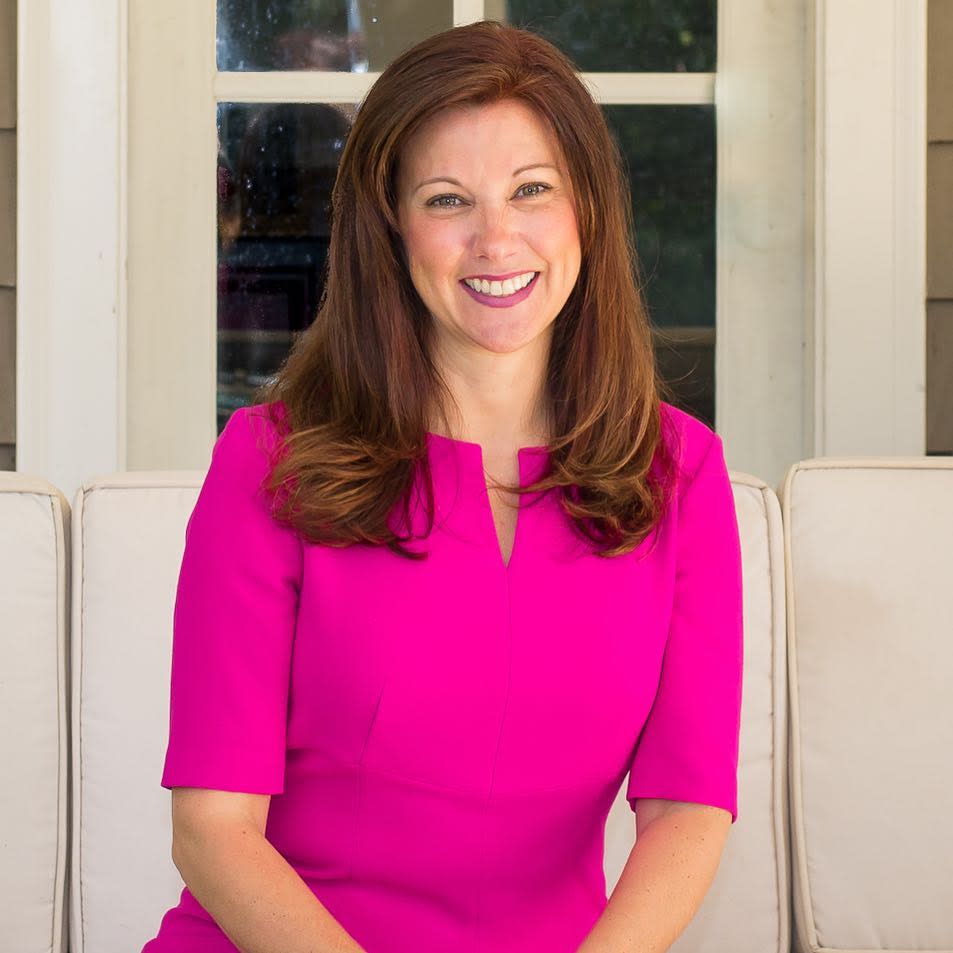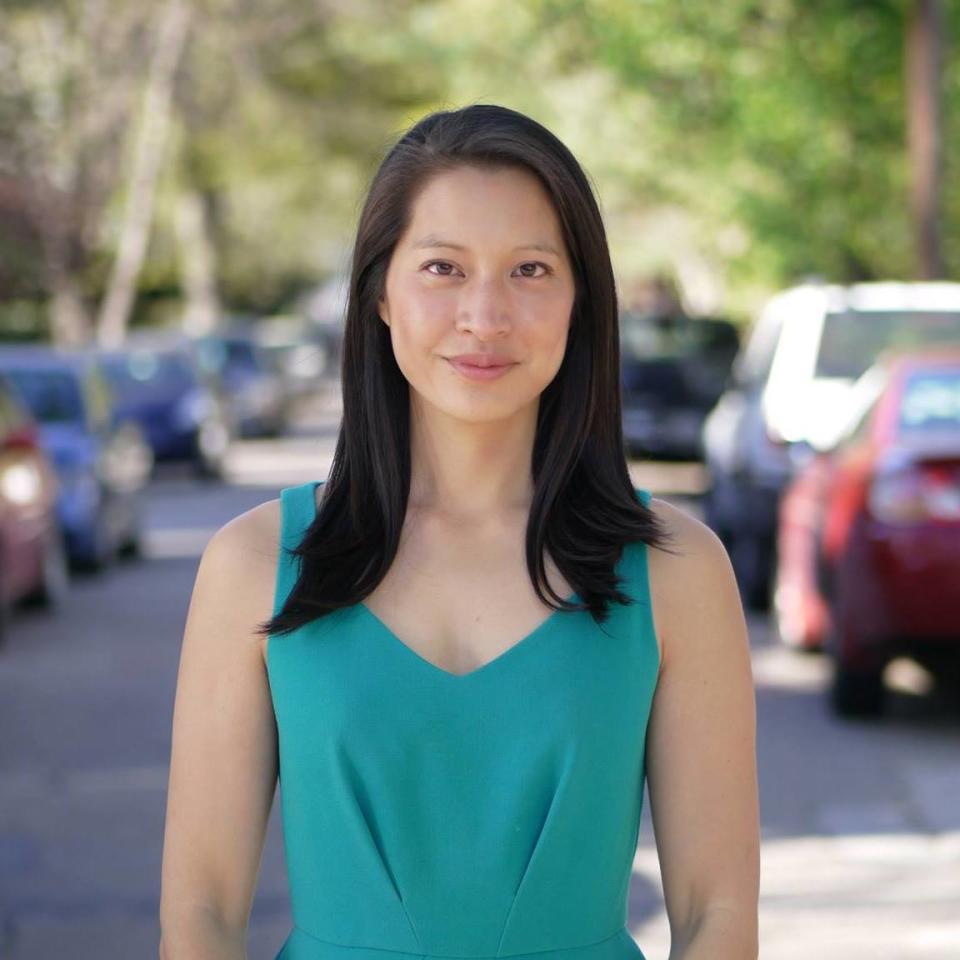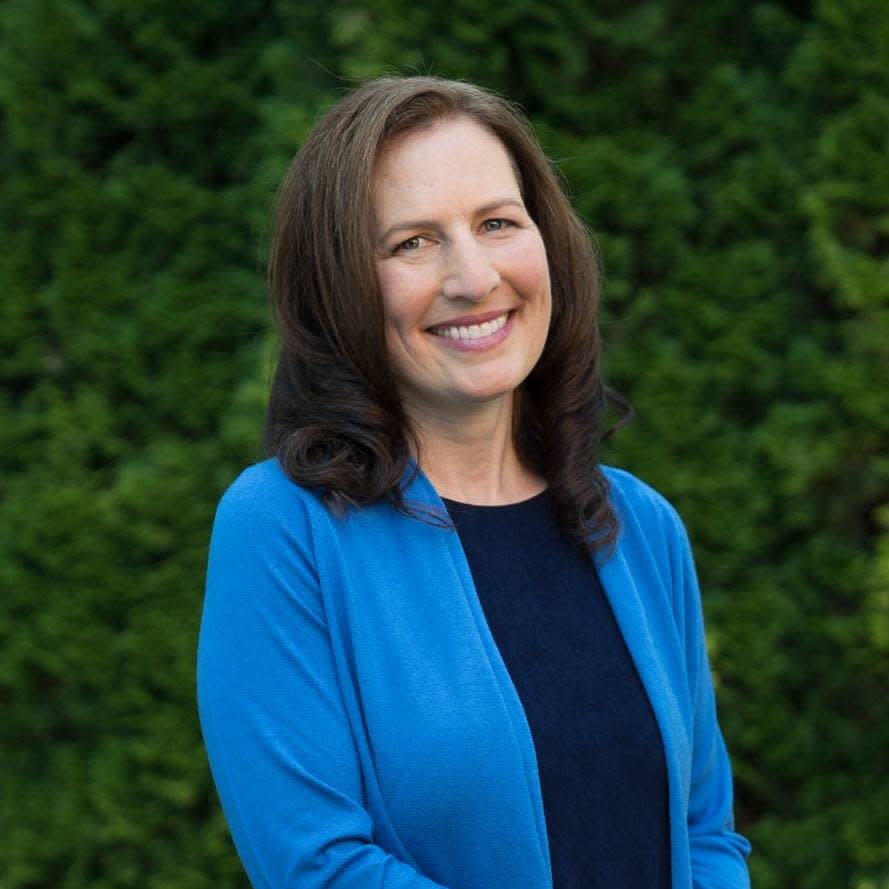'The reason was simple — Trump won': Why 9 women decided to run for political office
No one would’ve ever called Jennifer Slipakoff a slacker. She’d spent the past several years being actively engaged in her community of Kennesaw, Ga. — as a volunteer civil rights advocate, particularly around LGBTQ issues in the metro-Atlanta area, inspired by her role as mother of a transgender child. Still, after Donald Trump was elected, Slipakoff said that what she was doing — easily identifiable as selfless, heartfelt work by even the most casual observer — suddenly felt insufficient.

“I realized that I wasn’t doing enough, and that I could have done more to influence the outcome of the election,” Slipakoff tells Yahoo Lifestyle. “I could have knocked on more doors.”
But she didn’t allow regret to consume her. Instead, the mom and activist — who lives in a historically deep-red district in the suburbs — started asking close friends and local activists if they thought it might be worth it to run for the Georgia House of Representatives. And she was met with a collective and resounding YES.

“One of my goals was to not let our incumbents go unopposed — the person I am running against ran unopposed for the past 10 years,” she says about her current run. “So that’s what I talked about with my friends: Was it enough to run and take the risk? Is that compelling enough, to just run? And for me it was. Running itself felt like a win.”
Once Slipakoff threw her hat into the race, though, something interesting happened — her race went from looking “like a long shot,” she says, to something “difficult, but certainly doable.”
Her story feels emblematic of a major shift in politics that’s been building since the Women’s March in 2017, held the day after Trump’s inauguration and about to be repeated across the country, in different ways, for the anniversary on Saturday and Sunday. Since that inspiring day, women are not only running for office in record numbers, but also are doing so because of the deep motivations offered by this political moment. Yahoo Lifestyle spoke to nine such women, gaining inspiring insights along the way.

Leslie Cockburn, Virginia: ‘The reason I decided to run was very simple — Trump won.’
Stephanie Schriock, president of Emily’s List — a nonprofit that recruits and supports pro-abortion-rights Democratic women to run for office — tells Yahoo Lifestyle that the sea change has been energizing for the organization. “Tens of thousands of first-time Democratic women candidates are raising their hands to run for office, and we could not be more excited,” she says. “These women bring critical perspectives we’re missing in Congress, our state legislatures, and our city councils. They’re veterans, teachers, pediatricians, activists, single moms, and policy experts — and they will change the face of politics. This is the next decade of leaders.”
Since Election Day 2016, more than 26,000 women have signed up to run for office through Emily’s List, and another 8,000 have signed up to support these women’s campaigns.
“The reason I decided to run was very simple,” former journalist Leslie Cockburn, now a candidate for U.S. Congress from Virginia, tells Yahoo Lifestyle. “Trump won.”
Cockburn (who is the mother of activist-actress Olivia Wilde) explains, “I was offended by Trump for many reasons, largely having to do with what he had to say about women and what he said about journalists — using words like, ‘You are the enemy of the people.’ That’s a very charged term that crosses a line. I felt suddenly like I was looking at Berlin in 1932. And given my background and experience covering U.S. and foreign policy, I could see the extent of the damage he could do in Washington to everything I love about government. And then he did it.”
A key moment of inspiration, she adds, was attending the Women’s March on Washington. “I have marched many, many times in my life, but this one was very special. My children were there, my extended family, a whole group of us. It meant a lot, that it was this huge statement we were all making together.”
Cockburn’s district encompasses Charlottesville, Va., a place that she describes as the “frontlines of the Trump wars” ever since the events that followed a white supremacist rally there in August. But the fallout from the events there have, more than anything, prompted “huge amounts of activism — and it’s women who have started the resistance groups. There is a wave happening here. It’s kind of a tidal wave, and it’s because of women.”

Marie Newman, Illinois: ‘We have to save ourselves.’
Marie Newman is an entrepreneur, consultant, and anti-bullying activist who is running to unseat antiabortion and anti-LGBT Democratic incumbent Rep. Dan Lipinski in Congress. She too has a simple reason for running: “We have to save ourselves.” Lipinski currently represents parts of the Chicago area, in a district that former Secretary of State Hillary Clinton won by 15 points in the 2016 general election.
But Newman says that the “overriding, burning piece” of her decision to run was the “combination of seeing how the 2016 election cycle evolved and devolved. Personalities became more important in some ways and less important in others, policies mattered less than ever before — and then fast-forward to the point when Hillary lost the election and it became clear to me that no one was going to save us. We have to save us, and we have to jump off the sidelines to do it.”
She notes that running as a woman this year feels “significant in every way.”
“Women always have to work a little bit harder, and that’s no different in politics. We have to work harder to make the same amount of money as men or get to the same level in our professions as men. Now, interestingly, is that we have gotten a lot better about understanding the importance of being at the table instead of on the menu,” she says. “I think all women — whether female candidates or the people supporting them — understand this with precision now.”

Debbie Mucarsel-Powell, Florida: ‘I can’t even imagine what the alternative will be.’
Debbie Mucarsel-Powell immigrated to the United States from Ecuador as a child with her mother and sisters, and is currently running for U.S. Congress in the Miami area. When she was growing up, her mother worked two jobs to support her family while also attending night school to study English. Mucarsel-Powell herself started working at a doughnut shop at the age of 15 to help support her family, soon earning college scholarships. Today, she works for Florida International University’s College of Health and the Herbert Wertheim College of Medicine. And when the Trump agenda began to go into effect, she explains, it was personal.
“When we first came here, we didn’t have health insurance, so we went to community health clinics and Planned Parenthood clinics to get health care,” she explains. “I have used these health clinics to get basic health care services, and then I dedicated my career to ensuring that basic primary care is available to the people who need it most. I think it’s the government’s responsibility to take care of all of us. If we don’t bring Democrats to Congress and the Senate who can work to make sure that we take care of our families by providing these basic health care services, I don’t know what’s going to happen. I can’t even imagine what the alternative will be.”
And when it comes to anyone who doubts women’s ability to lead change in this country, Mucarsel-Powell says, “I want to talk to whoever is underestimating women right now. We have such inner strength. We are nurturers. We know what we need to do to take care of our children. We sacrifice ourselves to give, but at the same time we’re extremely strong, and I don’t think anyone should ever underestimate the strength of a woman.”

Stacey Abrams, Georgia: ‘This was the right time.’
Stacey Abrams is Georgia’s former state House minority leader. And in May, after serving for seven years in this position and 10 years in the Georgia House of Representatives, Abrams announced her bid for Georgia’s governorship. If elected, she will be the state’s first governor who is both African-American and a woman.
“The 2017 resistance movement really solidified for me why this was the right time,” she tells Yahoo Lifestyle of her decision to run. “We saw people across the country and particularly in Georgia who got that there was a real connection between good government and our living standards — having leadership that respects the people it leads and is not xenophobic, racist and misogynistic. That was put in sharp relief this year.” Abrams says.
She adds, “We need leaders who are reflective of their constituents’ values, values of diversity of beliefs, and the integrity of humanity. There is a hunger for authentic leadership, particularly for women and particularly for women of color who, for a very long time, have been left out of decision-making positions.”
Abrams says that the 2016 election showed that we need more women and people of color to take charge. “If you’re a person of color who has seen families torn about, deported, seen leaders say horrible things about you based on the color of your skin, it makes sense that you would decide now is your time to lead,” she says. “More women, more people of color are saying, ‘Look at me — I’m ready to lead, and you have to pay attention to my issues.’”

Bee Nguyen, Georgia: ‘We want to be part of the decision-making process.’
Bee Nguyen was just elected to Georgia’s State House of Representatives in November, filling the seat vacated by Stacey Abrams (above) when she announced her run for governor. The daughter of Vietnamese refugees and the founder of a nonprofit organization that works to empower and educate young women, especially those who come from disadvantaged communities, Nguyen says she learned to understand that having a diversity of opinion in government wasn’t just necessary, but something she herself had the power to make happen.
She was a critical voice in lobbying Georgia’s legislature in 2016 to pass a bill that would address the state’s rape kit backlog — untested evidence from a pileup of sexual assaults. The process, she says, showed her something important: “I belonged at the Capitol, whereas I had previously always felt out of place there. I realized it’s really important to have diverse voices at the table — not just in terms of race, but in terms of person and professional backgrounds, the kinds of work people do.”
Finally, Nguyen notes, “Everything shown to us in the past year has reminded us that it is incredibly important for us to participate.”

Kim Schrier, Washington: ‘That ticked me off.’
When the first repeal bill for the Affordable Care Act (ACA) was proposed in the U.S. House of Representatives last year, pediatrician Kim Schrier of Washington went with three other doctors from her practice to meet with the congressional representative. She explained “all the ways that bill would be bad for my patients, the district, and the country.” Then, two days later, Schrier’s representative voted “yes” to repeal the ACA.
“That ticked me off,” Schrier, now running for Congress, tells Yahoo Lifestyle. “I believe that the House of Representatives should be full of people who are regular people from the district, there to represent people from the district. There was no question that our district would be hurt by all these Trumpcare bills — so that meant we had a representative who didn’t want to represent us.”
If elected, Schrier will be the only female doctor in Congress — and she believes that’s a critical perspective currently missing, especially when it comes to women’s health and reproductive rights.
“The intersection of public health, women’s health, children’s health, and reproductive rights all go together,” Schrier says. “And clearly, all the men in Congress are not seeing the intersection.”
But she, like so many of the other women interviewed for this story, also believes that Congress needs more of another perspective: that of mothers.
“Moms teach their kids that everyone needs to play nicely in the sandbox, and that you don’t always get your way,” she says. “We should be modeling that you don’t always get your way, that you need to reach across the aisle to make things work, that you need to have a little less pride and ego and a little more listening and empathy.”

Aruna Miller, Maryland: ‘Democracy is delicate, and we need to take care of it.’
Aruna Miller, a civil engineer currently serving in Maryland’s state Legislature and running for U.S. Congress, is seeking higher office because of her commitment to empathy as an American value.
Miller emigrated from India to the United States at the age of 7, speaking no English when she arrived, and sipped cold milk for the first time in her life on her first day of school here. Seeing all the kids around her drinking their milk, she says, she kept on drinking and drinking her own, hoping this would help her fit in with her new classmates. Then, when she got back to class after lunch, she recalls, she threw up all over her desk.
But it was the events that followed that she says changed her whole life: Her mother picked her up from school, and the young Miller tearfully begged to go back to India. But that afternoon, one of her new classmates showed up at her house holding paintings that all the children in class had made for her.
“The teacher that was there taught the kids empathy,” Miller says. “She recognized the pain I felt, and she told the kids, ‘Make some paintings. This is hard for her.’ I felt included when I saw those paintings. The teacher taught an important lesson to those kids and to me, which is that empathy is the most important characteristic a human being can have. If you’re in this awesome position of being able to represent people through public office … you have to have empathy and understand the challenges and struggles of others. That’s what public service is about.”
And it’s not what Miller believes she is seeing reflected in the politics of the Trump administration.
“We’ve got an administration that’s reckless, erratic, egregious, hurtful, and xenophobic,” Miller says. “People are frightened. Immigrant kids are scared. Kids without [the Children’s Health Insurance Program] who no longer have health care are scared. So many people are scared, and I can’t let that happen.”
She continues, “This is a great country that offers so much in terms of dreams and the aspirations of people from all over the world. Democracy is delicate, and we need to take care of it and do so every single moment of the day. I want to go to Congress to take the people’s voice there with me — I want to take other people’s stories there with me, and make sure our government is reflective of our values and who we are.”

Katie Porter, California: ‘We don’t have enough working mothers of young children in our political system.’
Katie Porter, a consumer advocate whose résumé includes time working for Sens. Elizabeth Warren, D-Mass., and Kamala Harris, D-Calif., before they came to Congress, explains to Yahoo Lifestyle why she’s running for the U.S. House of Representatives: “We don’t have enough working mothers of young children in our political system. I have spent my whole career trying to help families, middle-class families who are being squeezed, and trying to stand up to the big banks going after those families. … I made my decision within a day or two of Trump’s election, and it was really about knowing that he wouldn’t fight for our families — and he went on to do this, and worse.”
Porter notes that she is a Cub Scout leader who drives a minivan. “I drive my three kids to school every day,” she says. “Being a working, middle-class mom, when I talk about the future of the public education system in this country needing to be vibrant and strong, it’s from the perspective of someone who takes their children to school every day to public schools in Orange County and has a child with special needs. That direct connection is important.”
It’s why women, says Abrams, should run from their place of experience, and use it as their guide. “The time is now,” she adds, with urgency. “The worst that can happen is that you don’t win. But every campaign changes the conversation and forces the other side to talk about issues. Sometimes running for office is about lifting your voice so others will answer your questions. It is hard to run — it’s expensive, and you still have to juggle your other responsibilities — but these are solvable problems. If you do nothing, bad wins. So if women are sitting there wondering if now is the time for them to run, the answer is unequivocally yes.”
Read more from Yahoo Lifestyle:
Follow us on Instagram, Facebook, and Twitter for nonstop inspiration delivered fresh to your feed, every day.

